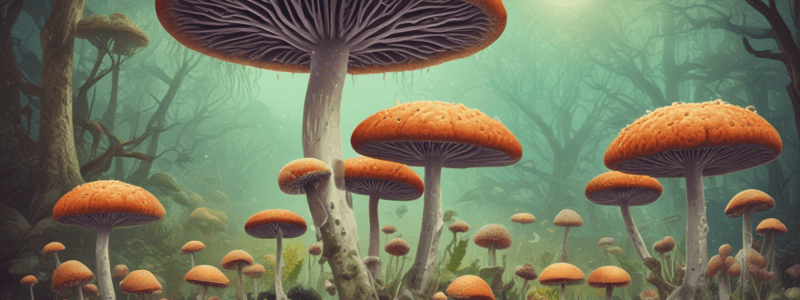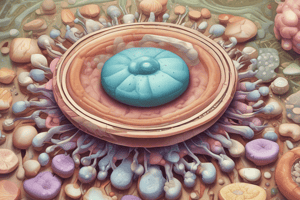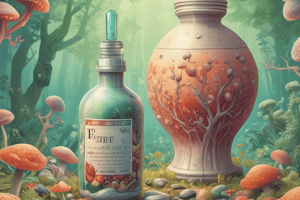Podcast
Questions and Answers
What is the primary habitat of Histoplasma capsulatum?
What is the primary habitat of Histoplasma capsulatum?
- Marine environments
- Decaying plant matter
- Soil rich with bird and bat droppings (correct)
- Freshwater lakes
Which type of infection is indicated by white patches inside the mouth?
Which type of infection is indicated by white patches inside the mouth?
- Skin infection
- Vaginal thrush
- Oral thrush (correct)
- Lung infection
Which factor DOES NOT enhance the growth of Candida in the mouth?
Which factor DOES NOT enhance the growth of Candida in the mouth?
- Corticosteroids
- Low levels of glucose (correct)
- Antibiotics
- Immunodeficiency
What condition is a sign of immunodeficiency in children?
What condition is a sign of immunodeficiency in children?
Histoplasmosis is most commonly found in which regions of the USA?
Histoplasmosis is most commonly found in which regions of the USA?
Which of the following conditions predispose individuals to vaginal thrush?
Which of the following conditions predispose individuals to vaginal thrush?
What organism causes Pityriasis (Tinea) Versicolor?
What organism causes Pityriasis (Tinea) Versicolor?
Which antifungal drug inhibits ergosterol synthesis?
Which antifungal drug inhibits ergosterol synthesis?
Why does Malassezia furfur require media containing oil for growth?
Why does Malassezia furfur require media containing oil for growth?
Which antifungal is primarily used topically due to its mechanism of action similar to Amphotericin B?
Which antifungal is primarily used topically due to its mechanism of action similar to Amphotericin B?
Which antifungal drug accumulates in keratinized tissue and is effective against dermatophytes?
Which antifungal drug accumulates in keratinized tissue and is effective against dermatophytes?
Which of these is a common isolate responsible for ringworm?
Which of these is a common isolate responsible for ringworm?
What is a characteristic of non-dermatophyte superficial infections?
What is a characteristic of non-dermatophyte superficial infections?
Which fungus is associated with Tinea capitis in adults?
Which fungus is associated with Tinea capitis in adults?
What type of aspergillosis involves a fungus ball growing in a pre-existing cavity?
What type of aspergillosis involves a fungus ball growing in a pre-existing cavity?
Which form of treatment is recommended for invasive aspergillosis caused by A. fumigatus?
Which form of treatment is recommended for invasive aspergillosis caused by A. fumigatus?
For which condition would you treat with Griseofulvin or Miconazole shampoo?
For which condition would you treat with Griseofulvin or Miconazole shampoo?
What percentage of cases see dissemination of Coccidioides immitis?
What percentage of cases see dissemination of Coccidioides immitis?
Which of these tissues is commonly involved in chronic cases of Coccidioides immitis?
Which of these tissues is commonly involved in chronic cases of Coccidioides immitis?
What are fungal infections called?
What are fungal infections called?
Which category does athlete's foot fall under?
Which category does athlete's foot fall under?
What is the pH of Sabouraud agar used to culture colonies?
What is the pH of Sabouraud agar used to culture colonies?
Which fungi group is not inhibited by cyclohexamide?
Which fungi group is not inhibited by cyclohexamide?
What is the most prevalent type of dermatophyte infection?
What is the most prevalent type of dermatophyte infection?
Which source of dermatophytes prefers soil?
Which source of dermatophytes prefers soil?
Which of the following is a method to prevent athlete's foot?
Which of the following is a method to prevent athlete's foot?
Which symptom is commonly associated with 'ringworm'?
Which symptom is commonly associated with 'ringworm'?
Flashcards are hidden until you start studying
Study Notes
Pityriasis (Tinea) Versicolor
- Superficial skin infection caused by yeast Malassezia furfur
- Characterized by pale or dark patches of skin
- Part of normal skin flora in majority of adults, but can cause problems
- Requires fatty acids for growth, so media must contain oil
Fungal Infections
- Poor range of antifungal drugs compared to antibacterials
- Interest in developing new drugs
Antifungal Drugs
- Amphotericin B: binds to ergosterol in cell membrane, broad spectrum, systemic
- Flucytosine: converted to fluorouracil, synergistic with amphotericin B
- Azoles (e.g. Fluconazole, Itraconazole): inhibit ergosterol synthesis, systemic
- Griseofulvin: accumulates in keratinized tissue, interacts with fungal microtubules, dermatophytes
- Nystatin: binds to ergosterol in cell membrane, topical
Histoplasma capsulatum
- Grows as mold in soil and culture, and as yeast or mold in animal tissues
- Intracellular parasite found in soil rich with bird and bat droppings
- Occurs in USA, endemic in Ohio and Mississippi River valleys
- Histoplasmosis: usually asymptomatic or flu-like symptoms with fever and cough
- 250,000 new cases each year in USA
Yeast Infections
- Candida
- Appears as Gram-positive, oval budding yeast
- Forms pseudohyphae in culture and tissues
- On Sabouraud agar, produces soft, cream-colored colonies with characteristic yeasty smell
- Submerged growth consists of pseudomycelia
Infections
-
Mouth
- Oral thrush: white patches inside mouth, most common in infants and AIDS patients
- Enhanced by corticosteroids, antibiotics, high levels of glucose, and immunodeficiency
-
Female genitalia
- Vaginal thrush or vulvovaginitis: irritation, discharge, intense itching
- Acid pH normally maintained by bacteria, suppressing Candida
- Diabetes, pregnancy, progesterone, and antibiotics predispose
-
Skin
- Occurs in warm parts of body
- Often follows immersion in hot water
-
Nails
-
Lungs and other organs
- May be secondary infection of lungs, kidney, and other organs under predisposing conditions
- Chronic mucocutaneous candidosis: sign of immunodeficiency in children
Ringworm (Tinea corporis, Tinea cruris)
- Dermatophytosis of non-hairy skin gives rise to annular lesions of ringworm
- Varying degrees of inflammation may be found
- Most common isolates: E. floccosum, T. rubrum, and T. mentagrophytes
- Treat with antifungal cream
Non-dermatophyte Superficial Infections
- Non-dermatophytes: faster growing, grow on Sabouraud agar only (pH altered and without cyclohexamide)
- Cause problems for immunocompromised patients with limited cellular immunity
Tinea capitis (Ringworm of the Scalp)
- Microsporum in childhood
- Trichophyton in adults
- Infection begins on skin of scalp and then down wall of hair follicle
- May appear as alopecia with scaling, black dot ringworm
- Trichophyton may also infect beard hair
- Treatment: remove hairs, treat with Griseofulvin or shampoo with Miconazole
Aspergillus
- Aspergillosis: group of mycoses caused by spp. of the filamentous fungus Aspergillus
- Infection comes from exogenous source
- Pulmonary aspergillosis may occur in distinct forms:
- One: aspergilloma, fungus ball growing in a pre-existing cavity (e.g. tuberculosis)
- Often asymptomatic or patient has a cough
Aspergillus
- Invasive aspergillosis: caused by A. fumigatus in immunocompromised patients
- Widespread destruction of tissue as fungus grows
- Treat with Amphotericin B
- Allergic aspergillosis: occurs in patients with elevated IgE levels
- 10-20% of asthmatics react to A. fumigatus
- Treatment: corticosteroids
Coccidioides immitis
- Dissemination occurs in less than 0.5% of cases
- Often immunocompromised patients
- Chronic cases: localized cavities in lungs filled with spherules (cylindrical bodies) of C. immitis
- Other tissues involved: bones, liver, meninges, brain, skin, and heart
- Can be treated with Amphotericin B
- High death rate in disseminated cases
Studying That Suits You
Use AI to generate personalized quizzes and flashcards to suit your learning preferences.




